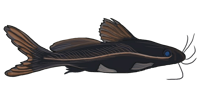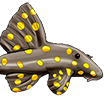Zhang, Z., Li, D., Refaey, M. M., Xu, W., Tang, R., & Li, L. (2018). Host age affects the development of southern catfish gut bacterial community divergent from that in the food and rearing water. Frontiers in Microbiology, 9, 495. doi: 10.3389/fmicb.2018.00495
https://www.frontiersin.org/articles/10 ... 5/abstract
Zhang et al. wrote:ABSTRACT
Host development influences gut microbial assemblies that may be confounded partly by dietary shifts and the changing environmental microbiota during ontogenesis. However, little is known about microbial colonization by excluding dietary effects and compositional differences in microbiota between the gut and environment at different ontogenetic stages. Herein, a developmental gut microbial experiment under controlled laboratory conditions was conducted with carnivorous southern catfish fed on an identical prey with commensal and abundant microbiota. In this study, we provided a long-term analysis of gut microbiota associated with host age at 8, 18, 35, 65 and 125 day post fertilization (dpf) and explored microbial relationships among host, food and water environment at 8, 35 and 125 dpf. The results showed that gut microbial diversity in southern catfish tended to increase linearly as host aged. Gut microbiota underwent significant temporal shifts despite similar microbial communities in food and rearing water during the host development and dramatically differed from the environmental microbiota. At the compositional abundance, Tenericutes and Fusobacteria were enriched in the gut and markedly varied with host age, whereas Spirochaetes and Bacteroidetes detected were persistently the most abundant phyla in food and water, respectively. In addition to alterations in individual microbial taxa, the individual differences in gut microbiota were at a lower level at the early stages than at the late stages and in which gut microbiota reached a stable status, suggesting the course of microbial successions. These results indicate that host development fundamentally shapes a key transition in microbial community structure, which is independent of dietary effects. In addition, the dominant taxa residing in the gut do not share their niche habitats with the abundant microbiota in the surrounding environment. It’s inferred that complex gut microbiota could not be simple reflections of environmental microbiota. The knowledge enhances the understanding of gut microbial establishment in the developing fish and provides a useful resource for such studies of fish- or egg-associated microbiota in aquaculture.
- Keywords: Host age, fish, Gut Microbiota, microbial ontogenesis, Rearing water, Food





